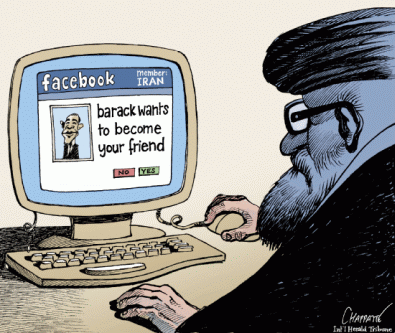 Of course the western media from Pacifica to Fox News will say its fraud, so here is some alternate views. Al Jazeera: (not necessarily very sympathetic to the Iranian government) below the headlines claiming Ahmadinejad victory, there is a significant tone of suspicion (I like the part 'our correspondents says how the hell did they count so fast?'). Xinhua: -- while stating that Mousavi claimed victory -- does not touch on the issue of vote rigging.
Of course the western media from Pacifica to Fox News will say its fraud, so here is some alternate views. Al Jazeera: (not necessarily very sympathetic to the Iranian government) below the headlines claiming Ahmadinejad victory, there is a significant tone of suspicion (I like the part 'our correspondents says how the hell did they count so fast?'). Xinhua: -- while stating that Mousavi claimed victory -- does not touch on the issue of vote rigging.Okay now for how I see it. First of all I only understand Iran by what my friends tell me and the little I have time to read. But in my defense I have been paying attention for a while now.
First of all, western reporters know way more Tehran intellectuals (Moussavi's base) than poor people from the countryside (Ahmadinajad's base). So I doubt the pre-election reporting was coming from a very representative sample. Combine this with the expectations generated from the Hezbollah loss it certainly would be possible for the western media to have totally botched the pre-election story, which anticipated a Moussavi landslide. Having said that, I still would bet its fraud for a number of reasons.
1) Pre-election the government did block facebook for a day or two (maybe they didn't know you could just ignore friend requests). What this tells me is that someone high up was -- at the very least -- thinking through all the dirty tricks that could be played.
2) In 2001 Khatami, a reformist, put together a coalition that was 78% of the vote. You're telling me that plummets to 32% just 8 years later? No way. Even Rafsanjani, widely seen as corrupt, got (was given) 36% of the vote 4 years ago.
3) You know the Hezbollah thing had to scare the hardliners. They had to come up with something fast. They went for a landslide victory be cause if you publish numbers like 49%-48% then people start thinking its so close there must have been fraud. While if you make it a landslide, well then, who can question that? Not having a second round would also be a plus. The lesson they may have learned from Ukraine is you can't wait until the second round to do the fraud.
However, what the world perceives is much less important than what the supporters of Moussavi perceive. Do they believe that the election was stolen? I would strongly bet they do. So then the question becomes what do they do about it. The reformists were deeply split after the 2004 parliamentary election as to how confrontational to be with the hardliners who had barred most of the reformist candidates. In the end Khatami (the reformist president at the time) decided against direct confrontation because he feared bloodshed and eventually the reformist movement gave way to apathy. Will Moussavi call people to the streets? By the way he declared victory, landing the first punch before the election commission announced the results for Ahmadinejad, tells me this is a man that is not going quietly. In situations like this, the fact that the capital city is also a bastion of opposition support (See Mexico City, Harare, and Kiev) will magnify the oppositions "people power." They've already got themselves a color: Green. Now that is thinking ahead. Unless I'm mistaken you are now mere hours away from "Green Revolution" headlines plastered in the western media, regardless of whether the Iranian opposition actually uses that phrase. However, Moussavi has to be careful not to overplay his hand. I doubt there are many in Iran that want street battles; is the level of frustration even above annoyance? You don't go from apathy 4 years ago, to revolutionary zeal now. Peaceful, yet dogged determination, goes over much better than pugnacious rabble rousing. Especially when you may be asking people to risk their safety in your cause. It is important to note that the state does not generate fear like it does in some countries; If people feel strongly, I have no doubt that they will make their voice heard. Don't forget about this dude.
 What level of force will the government decide to use? They've always been more of a "lock em' up" than "take them out back" in their treatment of dissidents. But if this really is massive fraud then the stakes are a lot higher now.
What level of force will the government decide to use? They've always been more of a "lock em' up" than "take them out back" in their treatment of dissidents. But if this really is massive fraud then the stakes are a lot higher now.In my estimation this is a time of possibility and peril in Iran and is only the beginning of an unfolding drama. What the real facts are I simply don't know, though I'm clearly not above guessing. But apart from all my speculation, I sincerely hope that this process will further the cause of peace between Iran and America and ultimately -- whatever the result may be -- for the people of Iran to have a government that its citizens view as legitimate; because that, after all, is what really matters most.


